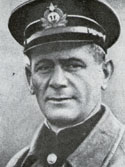Grigorii Goldberg was born in 1905 in St. Petersburg. His father was a factory worker. At the age of 13, Grigorii was taken onto a merchant ship as a ship's boy. Between 1918 and 1920 he took part as a Red Navy sailor in the civil war in Russia. In 1929 he graduated from a civilian sailors' college (tekhnikum) in Leningrad as a pilot and then sailed with merchant ships, visiting various countries – from England and Germany to Singapore. In 1933, he joined the Red Navy and, after completing a course in 1935, became the commander of a submarine.
An article on Goldberg published in the Yiddish newspaper Eynikayt in 1944 begins as follows: "The naval officer Grigorii Goldberg is 39 years old. For 26 years he has sailed seas and oceans." That was not true. In July 1938, Goldberg was arrested and in November of that year sentenced to a long term in the Gulag for "high treason." In December 1939, within the framework of "the Beria liberalization," he was unexpectedly freed from prison camp and returned to the Navy. From January 1940 he served as a commander of various submarines. After his release from prison, Goldberg carried out some special operations ordered by the Soviet leadership. According to some accounts, in June 1940 his submarine entered the western part of the Gulf of Finland (between Finland and Estonia) in order to provoke a military conflict between Estonia and the USSR.
In May 1942, Goldberg became the commander of the 3rd Submarines Battalion of the Baltic Military Fleet, as a captain 2nd rank. His battalion torpedoed dozens of enemy transport and military ships. Between 1942 and 1944 they did not lose a single submarine. Goldberg received an Order of Lenin, an Order of [Admiral] Ushakov, and other military awards.
In April 1944 Goldberg took part in the Third Meeting of Representatives of the Jewish People, that was held in Moscow.
Goldberg died in 1960.
A speech by the commander of a submarine battalion Captain G. Goldberg
[delivered at the Third Anti-Fascist Meeting of Representatives of the Jewish People, Moscow 1944]
"Brothers and Sisters!
…
During its entire history, full of sufferings, our Jewish people did not have such a fierce enemy that harbored a total hatred for the Jewish people as fascist Germany. We know of many cases of the brutal extermination of the Jewish population: in Kiev, Odessa, Kharkov, Kishinev, and many other cities and villages of the temporarily occupied areas of the Soviet Union; and we will never forgive to the German fascism for that. Revenge and only revenge for the blood and sufferings of the people!
The great fight of the Soviet people against bestial fascism is a fight for the existence of all of our multinational state, of all its peoples, that means – of the Jewish people too, and the Jewish people knows this and is taking a most active part in this great struggle for peace, justice, and for a free and joyous life.
We remember the rule: "Be the best among the sons of your family and the best first-line fighter in the array of the Soviet peoples."
Jewish fighters, from private to general, are participating in the great struggle of the freedom loving peoples against fascist Germany in all combat forces and with all kinds of weapons…"
From: Evreiskii narod v bor'be protiv fashizma: Materialy III Antifashistskogo mitinga predstavitelei evreiskogo naroda… (Moscow: Der Emes, 1945), pp. 29-30.







